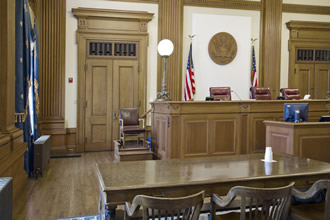Can I get a witness?
10 Tips for landing and performing work as an expert witness appraiser.
Litigation consulting and expert witness
work is a rewarding area of practice
for many appraisers. The work often is
intellectually stimulating and well-compensated
— indeed, the hourly rates for highly
regarded expert witness appraisers regularly
top the rates charged by the attorneys with
whom they work. Appraisers interested in
pursuing this type of work and those looking to
enhance existing skills should find the following
10 tips, pointers and suggestions helpful.
PART ONE - Getting the Work
1Speak, write, teach and develop a content driven website.
When lawyers need expert witness appraisers,
they - just like everyone else in the modern
world - start their search on the Internet. If
lawyers need an expert witness to testify about
the value of a Minnesota grain storage facility,
they probably will use key words similar to "real estate appraiser grain storage Minnesota."
Appraisers with a particular expertise
(say, grain storage facilities) who publish a
few articles - really, it only takes a few - can
position themselves at the top of the search
results. When an attorney sees your name pop
up, it creates a strong first impression.
Other ways to promote your expertise: make presentations
to various groups and organizations aligned with your field
(Appraisal Institute chapters can be very hospitable forums),
offer continuing education seminars and maintain a professional
website with original, useful content that features your
articles and presentations. Lawyers need to believe in your
expertise, so if you're targeting work as an expert in divorce
cases, write original content along the lines of "10 Tips for
Family Law Attorneys in Challenging Residential Appraisals."
Take it one step further and mail that article to 50 divorce
lawyers in your community.
2Attend attorney seminars and continuing legal education sessions.
Appraisers can connect with lawyers by
attending - or even speaking at - legal seminars
and continuing education sessions; it's
not unusual for groups to invite appraisers
to make presentations. County bar associations
and regional chapters of national lawyer
organizations often have specialty groups that
address such industry practice areas as real
estate litigation, property insurance claims,
environmental contamination, family law and
estates/trusts. Seek out events near you and
start networking. For example, one recent seminar presented at a section meeting of the American Bar
Association was titled "Condemnation 101, Discovery - Taking
the Deposition of the Opposing Appraiser and How Compensation
is Determined When the Highest and Best Uses or Per
Unit Values Are Not Uniform throughout the Property." Aside
from meeting attorneys who hire appraisers, you will see the
legal profession’s perspective on depositions and highest and
best use in condemnation cases.

3When responding to inquiries for expert work, be mindful of conflict issues.
Appraisers contemplating litigation work need
to be aware of conflict traps. Attorney-client
communications and attorney work product
(i.e., private materials or information
containing an attorney's theories, research,
impressions or analysis) are highly protected
by law. It’s not uncommon, however, for an
attorney to share confidential information
during the process of interviewing or hiring an
expert, such as an appraiser, because the attorney
assumes it will stay confidential. Problems
can arise when counsel on the other side of
the case then reaches out to the appraiser for
possible engagement (unaware the appraiser had been communicating
with opposing counsel). The legal concern is that the
appraiser - intentionally or not - may share confidential
information learned from the first attorney. Situations like
this sometimes lead to the disqualification of either the attorney
or the expert - or both - from further work on the case.
How can you avoid such
a scenario? If an attorney is
considering hiring you as an
expert, before any detailed
discussions about the case
take place, first ask for a list
with the names of the parties
and attorneys on all sides
and a caption page to ensure
there’s no conflict. The caption
page typically is the first
page of a lawsuit pleading document
that lists the names of
the parties and the court; however, the caption doesn’t always
show all parties, which is why you also need the list. Use this
information to make sure that you have not been engaged by or
received confidential information (even without being hired)
from any other parties in the current case or their counsel. You
also need to make sure you don’t have confidential information
relevant to the case that belongs to one of the other parties,
which you may have received as the result of prior work.
Start keeping a database of the cases and the identities of
the parties with which you’ve been involved; you can make a
very good impression on attorneys seeking to hire you when
they see how thoroughly you understand the importance of
conflict issues. Failing to show attorneys that you’re cognizant of conflicts can make them uncomfortable about hiring you.
Finally, before having detailed discussions with attorneys
about the possibility of being hired, you need to make it clear
that they should not discuss confidential information with you
until you actually are hired. If they do so and then don’t hire
you, you may be disqualified from being hired by opposing
counsel. It’s good practice to follow up initial inquiries with a
friendly but professional email confirming that no confidential
information was discussed.
4Don’t let the attorney who hired you be surprised in the middle of a case. One surefire way to displease an attorney
with your services as an expert is to have
previously undisclosed information come
out during litigation. Negative information or
matters that call your objectivity into question
usually will come out in discovery. The time to
disclose this information is when an attorney
is first considering your retention, not during
your deposition by opposing counsel. Topics
that need to be discussed include business or
personal relationships with any of the parties,
disciplinary matters, lawsuits relating to
your professional work and other work you've
performed concerning the property or very similar properties.
(Make sure you obtain authorization from prior clients if
confidential information is an issue, pursuant to the Uniform
Standards of Professional Appraisal Practice).
PART TWO - Doing the Work
5Don’t take things personally. The nature of litigation means that both you
and your expert witness work will be challenged.
It can be unpleasant, but any appraiser
doing this type of work should accept that it
comes with the territory. Still, we see appraisers
hired as experts who can't let things go
and file retaliatory complaints against other
appraisers with state appraiser regulators.
Needless to say, the practice is not a good one;
an expert needs to deliver viable theories in
court to help their clients, not grumble later to the state.
Further, your client likely will not be happy that you made
their legal issues part of another matter outside of court.

6Understand the "discoverability" of information in your workfile.
Attorneys and expert witness appraisers need
to pay close attention to whether or not draft
materials and other preliminary content in
their workfiles will be available to the other
side in discovery. In federal court, the discoverability
of draft reports is pretty clear: under
the revised version of Rule 26 of the Federal
Rules of Civil Procedure that took effect in
2010, draft reports and communications with
the attorney who retained the expert are not
subject to regular discovery by the other side.
However, there's a catch: Many states have rules of civil procedure
that do not follow the federal rule, which means that if
you are a testifying expert in a state court case in, say, California,
any draft reports you’ve created and your correspondence
with the attorney may be fully discoverable by opposing
counsel. Accordingly, in California and states with similar
laws, attorneys generally do not want their testifying experts
to create drafts until their likely opinions and underpinnings
to them are established. (See state laws on the discoverability
of draft reports at www.appraiserlawblog.com/2016/01/appraiser-expert-witness-issue.html.)
The bottom line for appraisers hired as experts with
respect to draft reports and written communications with the
attorney? Get the attorney’s specific direction on this matter
at the beginning of the engagement (different attorneys will
have different points of view) and maintain your workfile as if
everyone in the case - including the opposing side - will see it.
7Take extra time to do it right.On your first assignments as an expert witness,
expect to spend more time on your work than
what you actually bill for. Take time to properly
understand the cases, the problems, the
properties and the comparables - regardless
of whether or not you’re getting paid for the
extra time. Efficiency comes with experience.
8Avoid boilerplate language and forms. For most expert witness work, the most
appropriate and persuasive type of report
will be a narrative report, not a pre-printed
form. Be cautious about using generic statements
that may be commonplace in lending
assignments because they can diminish your
credibility in litigation. Read every word that
you use to make sure it can’t be misconstrued
or twisted.
9Carefully consider your assumptions. Your appraisal report assumptions, which can
run the gamut from "general" to "extraordinary,"
can leave your opinions vulnerable to
challenges from opposing counsel; extraordinary
assumptions are especially vulnerable
to attack on cross-examination or by another
appraiser performing a review. Exclude truly
unnecessary assumptions and then do the
work or research necessary to eliminate the
need for other assumptions. Be prepared to
vigorously explain and defend any assumptions that remain.
10Overreaching almost never works. Inexperienced expert witnesses often
overreach in their opinions, ending up with
unsupportable conclusions in an effort to
please a client. As you can imagine, this plan
usually backfires and opens the door for cross
examination that erodes your credibility.
When overreaching leads to absurdity, the
court could entirely disregard an appraiser’s
opinions, as occurred in a 2011 Tax Court trial.
The court threw out the appraisal testimony
supporting a taxpayer’s outlandish valuation of a conservation
easement, stating:
In most cases, as in this one, there is no dispute about the qualifications
of the appraisers. The problem is created by their
willingness to use their résumés and their skills to advocate
the position of the party who employs them without regard
to objective and relevant facts, contrary to their professional
obligations ... justice is frequently portrayed as blindfolded to
symbolize impartiality, but we need not blindly admit absurd
expert opinions. Boltar, L.L.C. v Commissioner, 136 T.C.
No. 14 (April 5, 2011).
Remember, great appraiser expert witnesses aren’t advocates,
and must remain impartial appraisers.
This article originally appeared in, and is reprinted from, Peter's regular column "Rest Insured" in the Appraisal Institute’s Valuation (4th Quarter, 2015). © 2015 by the Appraisal Institute, Chicago, Illinois. Archives of Valuation magazine, including Peter’s past columns, are available at http://www.appraisalinstitute.org/publications/valuation-magazine/
Companion Article
-
Feb 2016
The Witness Trap By Peter Christensen
Appraisers should only be in a courtroom if they’re paid to be there as consultants or expert witnesses. Unfortunately, some appraisers have discovered that their expert testimony can quickly transform them from expert to defendant...
Read Article